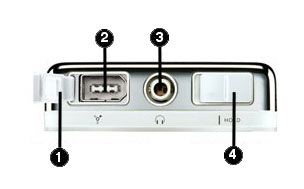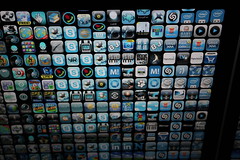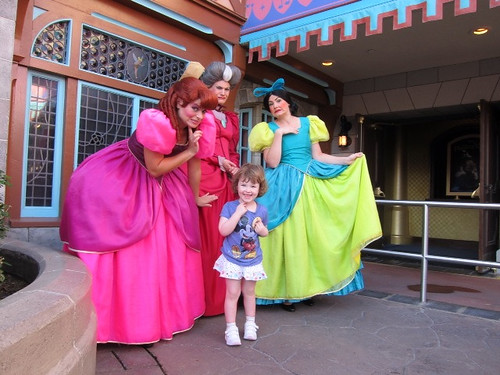So my previous post definitely got some responses, as I thought it might. Among them was a great, lengthy response from Jenny Levine (@shifted), and it was detailed enough that I decided to just repost the bulk of it here, and respond directly to the issues she raises. Here goes! (Jenny’s text is blockquoted)
As you can probably guess, though, I’m still going to disagree with you. I think Apple makes design decisions that you take for granted that aggravate the average user. For example, why the proprietary cable on the iPhone when they could have helped standardize on mini-USB? Why no right-click button on Macs when that would clearly help users? And don’t even get me started on the VGA dongle-thingy-that-everyone-forgets-at-home. My technophobic aunt wouldn’t know what to do with the apple icon in Mac OS, nor would she understand the command key. Best for n00bs? I don’t think so. Better than some other systems for some people? Sure.
 I think that the vast majority of Apple’s design decisions have a lot of consideration and thought behind them. Why the proprietary cable? The 1st and 2nd generation iPods didn’t use a proprietary cable at all (I assume here you refer to the 30 pin dock connector). They used a firewire port, standard at the time on Macs but largely missing from Windows machines of the era (2001-2002). By the 3rd generation of iPods, Apple had a problem…they needed to support their legacy products that used Firewire to sync and charge, but they wanted to move towards the now-solidified USB 2.0 standard (keep in mind, USB 2.0 was only ratified in 2001, and the first Apple computers to have USB 2.0 didn’t appear until 2003). So how do they do that elegantly? They design a cable that handles both protocols, and can connect to both USB 2.0 and to Firewire…not a simple thing, technically. The two protocols have different charging standards, and Apple did what, at the time, was the simplest thing they could…one cable for any user. It wasn’t until the 4th generation of iPod hardware that sales really started taking off, and as sales grew accessory manufacturers began to license the connector in order to interface with the iPod. Now Apple had two problems: they needed to continue the march to USB and they had an existing set of accessories that they had to think about. So they kept the 30 pin Dock Connector…and didn’t switch to Mini or Micro USB.
I think that the vast majority of Apple’s design decisions have a lot of consideration and thought behind them. Why the proprietary cable? The 1st and 2nd generation iPods didn’t use a proprietary cable at all (I assume here you refer to the 30 pin dock connector). They used a firewire port, standard at the time on Macs but largely missing from Windows machines of the era (2001-2002). By the 3rd generation of iPods, Apple had a problem…they needed to support their legacy products that used Firewire to sync and charge, but they wanted to move towards the now-solidified USB 2.0 standard (keep in mind, USB 2.0 was only ratified in 2001, and the first Apple computers to have USB 2.0 didn’t appear until 2003). So how do they do that elegantly? They design a cable that handles both protocols, and can connect to both USB 2.0 and to Firewire…not a simple thing, technically. The two protocols have different charging standards, and Apple did what, at the time, was the simplest thing they could…one cable for any user. It wasn’t until the 4th generation of iPod hardware that sales really started taking off, and as sales grew accessory manufacturers began to license the connector in order to interface with the iPod. Now Apple had two problems: they needed to continue the march to USB and they had an existing set of accessories that they had to think about. So they kept the 30 pin Dock Connector…and didn’t switch to Mini or Micro USB.
If you ignore all that history, it’s easy to say “why do they maintain a proprietary connector”. But if you look at the timeline of the development of the technology, there’s nearly always a reason for seemingly silly decisions. It is also true that by licensing the dock connector (to which they hold the patent) they make additional money from accessory makers. But I think that’s a side effect, a happy accident on Apple’s part. I think they got here by trying to do the right thing for existing customers.
Why no right click? I’m sorry, but every time someone busts out this canard, I laugh. Apple has had right mouse button functionality built in since OS 8.6, over 10 years ago. And the fact that you assume that right-click helps users only illustrates your point made later, that everyone who is familiar with a technology assumes it’s the right way to do things. Right-clicking is a UI choice, and it’s one that Apple downplays, on purpose. If you’ve ever had to walk a new computer user through the “no, that’s a left click…yes, now that function is a right click” dance, you’ll understand why Apple makes the decisions it does on the OSX interface. But if you want, it’s there, and has been for a decade now.
The VGA dongle annoys me. But it annoyed me the same amount that having a VGA connector and needing a DVI connector does on non-Mac machines. I don’t fully understand why Apple chose to go down the mini Displayport route, but if I had to guess, I would guess it had something to do with aesthetics, and keeping the profile of their laptops where it is. But on the scale of computing annoyances, it’s pretty low…and I use the dongle all the time. Most laptop users never hook their system up to an external display.
And after all, if Apple truly is designing the best experience for the average user, why deliberately price their products in a way the average user can’t afford? I think Apple fails to understand that the average user cares more about the cost of the data plan than having the highest number of pixels on a screen.
This is another point where I think you underestimate how non-fanboys feel about this issue. You say yourself that you honestly don’t care about cost, and that’s fine. But I don’t believe that’s how most people feel. I realize you’re giving your opinion here, but it’s the statements that imply “best for everyone else’s purposes” that I think cause those misunderstandings.
I’ve never said that “I don’t care about cost” end-of-sentence. I’ve said that cost isn’t a function of what I judge to be well-designed on the user interface front. I think that the en toto user experience of a 2011 Jaguar XK is probably objectively better than the user experience of the Honda Civic that I drive. The fact that I can’t afford the Jaguar doesn’t effect my ability to identify that it’s a better car, in a specific set of ways that could be enumerated, than my Civic. If you asked the average person which they thought would be the better experience, I think most people would choose the Jaguar. And if you had the ability for people to drive each of the two cars, I think that more people would say that the Jaguar was easier to drive, more pleasant, and that they like it more. All of those things are independent of whether or not a particular person can actually afford the Jaguar….and if you don’t like Jaguars, insert your car-of-choice into the equation.
As for the AT&T piece, if you want to talk about a revolution, Apple blew the telecom one big time by limiting the iPhone to AT&T. That’s more my complaint than the crappy networks in big cities. Apple could have opened up all cell carriers but instead chose its traditional path of high-end, expensive monopoly. That’s their choice, but we don’t all have to agree that its the best one they could have made. So while they’ve innovated in some areas, they’ve hurt innovation in others. Like any company, they’re good and bad but I’d hardly call them the best, certainly not for everyone. Ask your friends on Ping how they feel about that “best” or “innovative” label. 
No, as a matter of fact, Apple could not have “opened up all cell carriers”. Apple didn’t limit the phone to AT&T…as a matter of fact, Verizon turned Apple down when it was offered to them. Apple’s decision point had nothing to do with which carrier to offer the iPhone on, it had to do with shaking up the traditional balance of power in the mobile industry.
In the US, all of the power in the cell phone equation once lay with the carrier…the carrier, whether it be Verizon, AT&T, or Sprint, decided what features the phones they offered could have, how those features were implemented, and what limitations could be placed on them. The manufacturer of the phone had to bow to the wishes of the carrier, because otherwise they couldn’t sell their phone at all. Verizon was once legendary for this behavior, forcing handset makers to limit the bluetooth stack on their phones to prevent customers from being able to connect and retrieve the pictures from their phones without paying Verizon a fee for doing so! When Apple, a complete upstart in the mobile phone world, went to the carriers and said no to the usual demands for limitations on the phone hardware. Cingular was, at the time, the only carrier who agreed to Apple’s demands…most people forget that it was Cingular that actually got the iPhone contract, and that it purchased AT&T Mobility and changed it’s name afterwards. Apple signed a deal with Cingular/AT&T precisely because they were the only carrier who would let them make the phone they wanted…a phone without the crapware, without the custom UI skins, and without logos emblazoned all over it.
Re: Ping. I never claimed that everything Apple does turns to gold. They’ve had some real flubs in the past…iPod HiFi anyone? Ping isn’t likely to go anywhere without Facebook support, and they are still working that bit out. But to list Ping as an indication that Apple isn’t innovative? Come on…you’re kidding, right?
I’ll also reiterate what Josh said. Using market cap as a criterion is a little crazy. By that measure, Microsoft was a better company than Apple until this year. Is that really the point you want to argue? I sure don’t, least of all because I don’t see how that can be considered “objective.”
I wasn’t using Market Cap as an illustration of the better company. I was using market cap as an illustration of whether or not people believe the company is doing a good job of the thing that company does. I would never begin to argue that Exxon-Mobile is a morally good company. I would, however, argue that they are very good at what it is they do…that’s why they are worth what they are worth. Microsoft was, for many years, better at what they did than Apple was…but I don’t think they were at all doing the same thing. Market Cap isn’t a measure of Apple’s actual innovation, but it is very much an indicator of what the public qua public believe about Apple. And clearly they believe that Apple is doing a good job at what Apple does. We can bicker about what it is that Apple does, however, which is what we are doing with the rest of the discussion. 🙂
If you want to argue it is, then let’s talk about how quickly the Android OS is catching up to iOS. If it overtakes Apple in the smartphone market, are you prepared to acknowledge that more people think Google is a better and more innovative company than Apple? You made a prediction earlier this year that the $99 iPhone would blow everything else out of the water but it hasn’t, so I would counter-argue that a lot of people *disagree* with you, too.
Apple has never been concerned with being having the highest market penetration rates for their hardware….and I don’t think anyone paying attention would disagree that Android is going to dominate the cell phone market. It already is! Android is winning the overall market in the same way that Microsoft did for the PC market in the 1980’s: it’s providing a hardware-agnostic OS that will run on just about everything. Consequently, just about everything is running it. As well they should…Android is a phenomenal operating system. I said before: I wanted to buy an Android handset instead of the iPhone 4. But I couldn’t because the good handset was on another carrier (sound familiar?).
I’m obviously not daft enough to argue that numbers alone decide the best in anything.
I think the second-to-last paragraph started out to be your strongest (well, except for the market cap detour), and I wish you’d fleshed out some of the additional “and another thing” pieces, because I think that would help address the “blind fanboy” label. This post still comes across as “yay Apple, best company ever,” rather than as a balanced critique. Each of your main points above still ends with a “but Apple’s still awesome and right and releasing unicorns into the world.”
I am, honestly, completely agnostic about Apple qua Apple. I don’t own Apple stock. I think that they have some incredibly talented people…Jobs is a mad genius, and Jon Ives is a brilliant designer. When Apple still had DRM on the music they sold in the iTunes store, I couldn’t stand it…so consequently I didn’t buy things from the iTunes store. Still don’t, for the vast majority of things, because I prefer the Amazon MP3 store. But what I didn’t do was conflate the issue that the iPod was still the best MP3 player I could buy, even though I didn’t like the store attached to it. I really disagree with the rules associated with developing for the App Store, and have publicly told libraries that have asked me that they are better off developing for the web than for a given private platform. But I can believe that, and still think that the User Experience for an iOS device attached to the App Store is best-in-class. As Whitman said: “I am large, I contain multitudes.”
Whew. If you’ve read both these posts, thank you. I’m tired of writing about Apple now. Maybe I’ll curl up with my iPad and read some more Whitman. 🙂
 I think that the vast majority of Apple’s design decisions have a lot of consideration and thought behind them. Why the proprietary cable? The 1st and 2nd generation iPods didn’t use a proprietary cable at all (I assume here you refer to the 30 pin dock connector). They used a firewire port, standard at the time on Macs but largely missing from Windows machines of the era (2001-2002). By the 3rd generation of iPods, Apple had a problem…they needed to support their legacy products that used Firewire to sync and charge, but they wanted to move towards the now-solidified USB 2.0 standard (keep in mind, USB 2.0 was only ratified in 2001, and the first Apple computers to have USB 2.0 didn’t appear until 2003). So how do they do that elegantly? They design a cable that handles both protocols, and can connect to both USB 2.0 and to Firewire…not a simple thing, technically. The two protocols have different charging standards, and Apple did what, at the time, was the simplest thing they could…one cable for any user. It wasn’t until the 4th generation of iPod hardware that sales really started taking off, and as sales grew accessory manufacturers began to license the connector in order to interface with the iPod. Now Apple had two problems: they needed to continue the march to USB and they had an existing set of accessories that they had to think about. So they kept the 30 pin Dock Connector…and didn’t switch to Mini or Micro USB.
I think that the vast majority of Apple’s design decisions have a lot of consideration and thought behind them. Why the proprietary cable? The 1st and 2nd generation iPods didn’t use a proprietary cable at all (I assume here you refer to the 30 pin dock connector). They used a firewire port, standard at the time on Macs but largely missing from Windows machines of the era (2001-2002). By the 3rd generation of iPods, Apple had a problem…they needed to support their legacy products that used Firewire to sync and charge, but they wanted to move towards the now-solidified USB 2.0 standard (keep in mind, USB 2.0 was only ratified in 2001, and the first Apple computers to have USB 2.0 didn’t appear until 2003). So how do they do that elegantly? They design a cable that handles both protocols, and can connect to both USB 2.0 and to Firewire…not a simple thing, technically. The two protocols have different charging standards, and Apple did what, at the time, was the simplest thing they could…one cable for any user. It wasn’t until the 4th generation of iPod hardware that sales really started taking off, and as sales grew accessory manufacturers began to license the connector in order to interface with the iPod. Now Apple had two problems: they needed to continue the march to USB and they had an existing set of accessories that they had to think about. So they kept the 30 pin Dock Connector…and didn’t switch to Mini or Micro USB.





